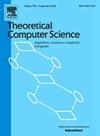Chemical mass-action systems as analog computers: Implementing arithmetic computations at specified speed
IF 0.9
4区 计算机科学
Q3 COMPUTER SCIENCE, THEORY & METHODS
引用次数: 0
Abstract
Recent technological advances allow us to view chemical mass-action systems as analog computers. In this context, the inputs to a computation are encoded as initial values of certain chemical species while the outputs are the limiting values of other chemical species. In this paper, we design chemical systems that carry out the elementary arithmetic computations of: identification, inversion, mth roots (for ), addition, multiplication, absolute difference, rectified subtraction over non-negative real numbers, and partial real inversion over real numbers. We prove that these “elementary modules” have a speed of computation that is independent of the inputs to the computation. Moreover, we prove that finite sequences of such elementary modules, running in parallel, can carry out composite arithmetic over real numbers, also at a rate that is independent of inputs. Furthermore, we show that the speed of a composite computation is precisely the speed of the slowest elementary step. Specifically, the scale of the composite computation, i.e. the number of elementary steps involved in the composite, does not affect the overall asymptotic speed – a feature of the parallel computing nature of our algorithm. Our proofs require the careful mathematical analysis of certain non-autonomous systems, and we believe this analysis will be useful in different areas of applied mathematics, dynamical systems, and the theory of computation. We close with a discussion on future research directions, including numerous important open theoretical questions pertaining to the field of computation with reaction networks.
作为模拟计算机的化学物质作用系统:以指定速度执行算术计算
最近的技术进步使我们能够将化学物质作用系统视为模拟计算机。在这种情况下,计算的输入被编码为某些化学物质的初始值,而输出则是其他化学物质的极限值。在本文中,我们设计的化学系统可进行以下基本算术计算:识别、反演、第 m 次根(m≥2 时)、加法、乘法、绝对差、非负实数的整除减法和实数的部分实数反演。我们证明,这些 "基本模块 "的计算速度与计算的输入无关。此外,我们还证明,并行运行的此类基本模块的有限序列可以对实数进行复合运算,而且运算速度与输入无关。此外,我们还证明,复合计算的速度正是最慢基本步骤的速度。具体来说,复合计算的规模,即复合计算所涉及的基本步骤的数量,不会影响整体渐近速度--这是我们算法并行计算特性的一个特征。我们的证明需要对某些非自治系统进行仔细的数学分析,我们相信这种分析将有助于应用数学、动力系统和计算理论等不同领域的研究。最后,我们讨论了未来的研究方向,包括与反应网络计算领域相关的许多重要的开放性理论问题。
本文章由计算机程序翻译,如有差异,请以英文原文为准。
求助全文
约1分钟内获得全文
求助全文
来源期刊

Theoretical Computer Science
工程技术-计算机:理论方法
CiteScore
2.60
自引率
18.20%
发文量
471
审稿时长
12.6 months
期刊介绍:
Theoretical Computer Science is mathematical and abstract in spirit, but it derives its motivation from practical and everyday computation. Its aim is to understand the nature of computation and, as a consequence of this understanding, provide more efficient methodologies. All papers introducing or studying mathematical, logic and formal concepts and methods are welcome, provided that their motivation is clearly drawn from the field of computing.
 求助内容:
求助内容: 应助结果提醒方式:
应助结果提醒方式:


